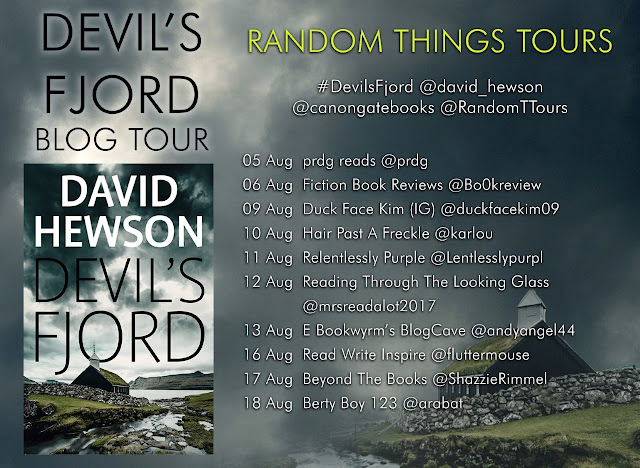A remote island. An isolated community. A terrible secret.
If the new District Sheriff, Tristan Haraldsen, thought moving to a remote village on the island of Vagar would be the chance for a peaceful life with his wife Elsebeth, his first few weeks in office swiftly correct him of that notion.
Provoked into taking part in the village’s whale hunt against his will, Haraldsen blunders badly, and in the ensuing chaos two local boys go missing. Blaming himself, Haraldsen dives into the investigation and soon learns that the boys are not the first to have gone missing on Vagar.
As Tristan and Elsebeth become increasingly ensnared by the island’s past, they realise its wild beauty hides an altogether uglier and sinister truth.
It's such a pleasure to be hosting the blog tour for Devil's Fjord today. Many thanks to David Hewson, Canongate Books and Anne Cater from Random Things Tours for inviting me and for sending me an advance copy of the novel.
I've read and loved a few novels by David Hewson but up until now have only read those set in Italy. Devil's Fjord, however, is set on the remote Faroese island of Vagar where Tristan Haraldsen has recently accepted the role of District Sheriff there.
Having taken early retirement from his office job with the police due to a minor heart complaint, Haraldsen and his wife, Elsebeth were moved to Vagar after becoming enamoured by its stark beauty, but as so often happens with those who fall in love with places they've just visited, their expectations are not matched by reality. His new job means he must supervise the grind - or whale hunt - particularly now the outside world disapproves of the bloody slaughter. David Hewson's description of the blackfish hunt is intense and unsentimental, addressing the sheer, brutal scale of the slaughter while still acknowledging the hypocrisy of those who buy their meat neatly packaged from supermarkets. It's a dramatic start to the book but after Haraldsen attempts to intervene when he witnesses a young boy, Jónas carrying out a frenzied attack on a young whale, it quickly becomes apparent that the dying village of Djevulsfjord has other reasons to shun the outside gaze of the world.
Although most of the novel follows Haraldsen, parts of the narrative give readers a clearer insight into the activities and motivations of other characters, including the aforementioned Jónas and his older brother, Benjamin. Jónas is an intelligent, sly boy with a cruel streak that sees him taunting Benji, who is barely verbal and labelled by the villagers as 'thick' - although as Tristan realises, it's likely that he is an undiagnosed autistic child. It means that we are more aware of where the boys are than the villagers who scour the cliffs and hillsides looking for the boys after they disappear.
Tristan and Elsebeth soon learn that attitudes are different here and at first there is little concern for the boys, with most people expecting them to reappear unharmed and due a beating after a night outside. This sense that Djevulsfjord is a place with its own set of rules and traditions ensures there's an otherworldly feel to the village, even down to the legends behind its name and of the black-sand Selkie beach nearby. With its imposing cliffs, skies illuminated by the Northern Lights and always, the powerful sea as both a giver and taker of lives, there's something rather folkloric about Devil's Fjord, although it's of the older, more sinister type rather than the sanitised fairy-tales of today.
After tragedy hits the village, it gradually becomes obvious that this place is tainted by more than the blood of whales and even Tristan and Elsebeth don't remain untouched by the pressure to keep secrets. This is a melancholy, anxiety-inducing read which gradually reveals the true darkness that lies behind closed doors. With inhabitants who mistrust any sort of outsider, even those who come from more populous parts of the Faroe Islands, discovering what is being kept hidden here and why, puts those who search for answers at risk of ostracisation and perhaps worse.
Throughout the novel, readers are given chilling glimpses into the unsettling, oppressive complicity of this strange, isolated place but even so, the latter chapters become almost too tense and increasingly disturbing, culminating in a shattering conclusion. Bleak, suspenseful and utterly compelling, this atmospheric, mournful thriller is breathtaking Nordic Noir at its blackest. Highly recommended.
Devil's Fjord is published by Canongate Books and can be purchased from Bookshop.org, Hive, Waterstones, Kobo and Amazon but please consider supporting independent bookshops whenever possible.
Don't miss the rest of the blog tour, details are below.
About the Author
David Hewson is a former journalist with The Times, the Sunday Times and the Independent. He is the author of more than twenty-five novels including his Rome-based Nic Costa series, which has been published in fifteen languages. He has also written three acclaimed adaptations of the Danish TV series The Killing.




Thanks so much Karen xx
ReplyDelete